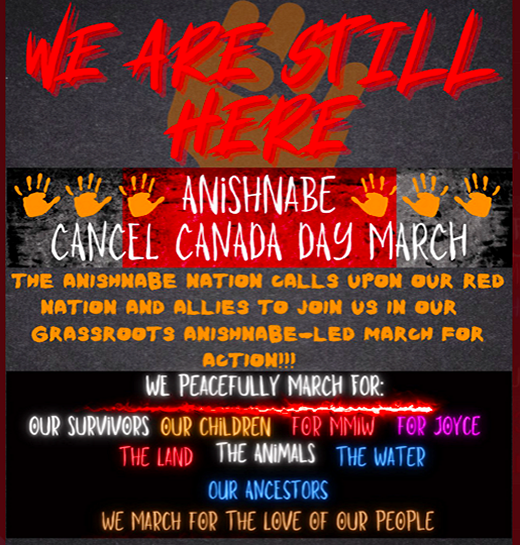
| No. 17 | July 1, 2021 |
|
CONTENTS • The Need to Build Canada on the New Historical Basis - Communist Party of Canada (Marxist-Leninist) - • The
Constitution Does Not Provide the Rights of • A Modern Constitution for Canada Is a Historical Need • Conception of Rights in Canada's Constitution Canada Day 2021 The Need to Build Canada on
|
Canada Day 2021 marks the 154th anniversary of Confederation established by the Royal Proclamation of 1867. Canadians from coast to coast to coast are marking the occasion by joining as one with the Indigenous peoples to decry what Canada stands for as concerns its relations with Indigenous peoples since Confederation and before and, most importantly, today. These relations are enshrined in the form of property relations which establish an authority over Indigenous nations, negating their right to their lands, their resources and their way of life, free from the interference of the Anglo-Canadian colonial state constituted in 1867.
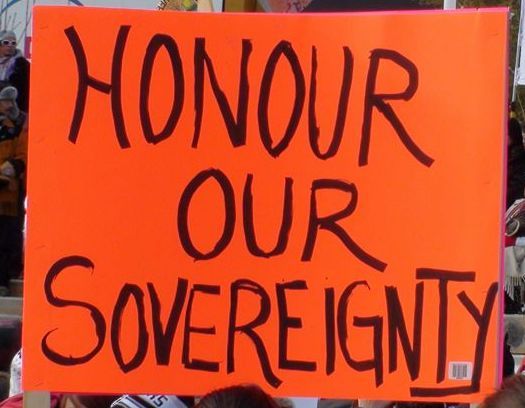 The
revelation of unmarked graves linked to the residential school system
places the responsibility squarely in the hands of the Canadian state
and government which continue to uphold the principles on the basis of
which Canada was founded. The nature of the relations was established
by Canada's founding fathers at the behest of the British colonizers.
Sir John A. MacDonald was the face of the assimilationist policy
whereby Indigenous peoples were considered non-persons. As wards of the
state, they could be stolen from their families, subjected to brutal
inhuman treatment and even buried in unmarked graves when they
succumbed to the conditions imposed on them by the religious orders
acting at the behest of the government because their names had been
stolen from them.
The
revelation of unmarked graves linked to the residential school system
places the responsibility squarely in the hands of the Canadian state
and government which continue to uphold the principles on the basis of
which Canada was founded. The nature of the relations was established
by Canada's founding fathers at the behest of the British colonizers.
Sir John A. MacDonald was the face of the assimilationist policy
whereby Indigenous peoples were considered non-persons. As wards of the
state, they could be stolen from their families, subjected to brutal
inhuman treatment and even buried in unmarked graves when they
succumbed to the conditions imposed on them by the religious orders
acting at the behest of the government because their names had been
stolen from them.
Nothing could better underscore the necessity to enact a new Constitution to replace the one that was used to found Canada under the conditions that prevailed in 1867 and its alleged modernization in 1982. The 1982 incorporation of a Charter of Rights and Freedoms further underscored that a power above the people gets to define the limitations on rights. Amongst other things, the limitation which advantage the ruling power criminalizes the right to speak and act in a manner that is to the advantage of the people. The need to renew the democracy and to renew the nation so that its aim is the wellbeing of all, not the few, is a historical challenge which must be accomplished in order for Canada to meet the needs of its people and contribute the same to the peoples of the world. A modern constitution must abolish the Royal Prerogative on which the present Constitution is based. It must vest sovereignty in the people and get rid of the police powers which maintain privileges in lieu of rights.
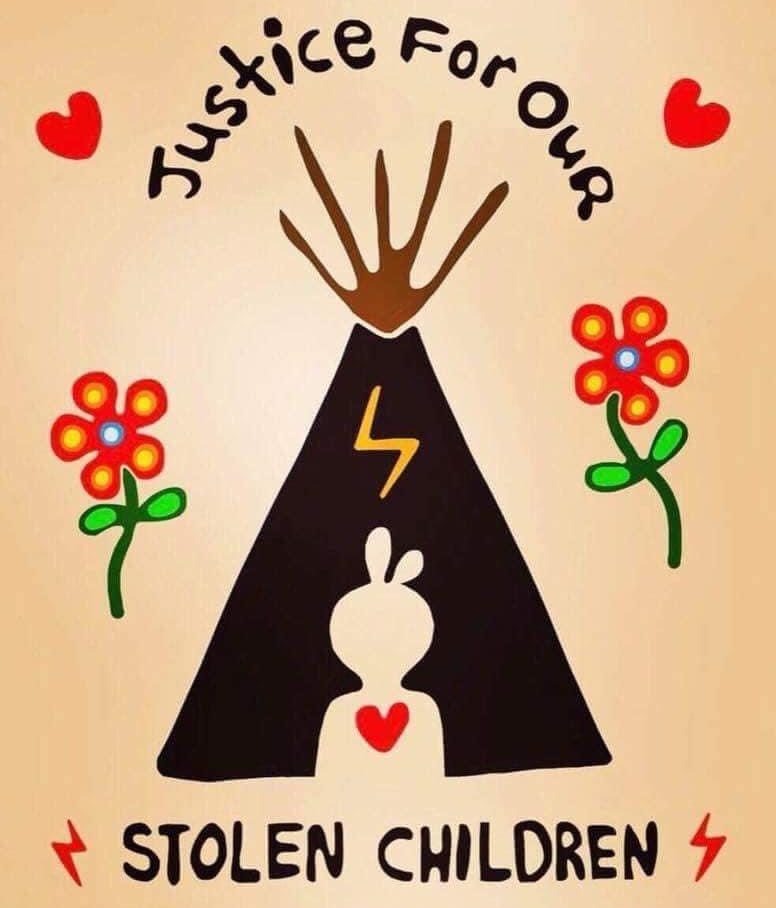 A modern constitution for Canada
is needed
to end the colonial
injustice and old arrangements suffocating the Indigenous peoples. Such
a constitution must implement the principle of
nation-to-nation relations. If the federation is to be free and equal,
it must recognize Quebec's right to self-determination and the rights
of the Métis nation as well.
A modern constitution for Canada
is needed
to end the colonial
injustice and old arrangements suffocating the Indigenous peoples. Such
a constitution must implement the principle of
nation-to-nation relations. If the federation is to be free and equal,
it must recognize Quebec's right to self-determination and the rights
of the Métis nation as well.
A modern constitution recognizes the rights of all human persons by virtue of being human. It must end all notions of superior and inferior cultures and races, rooted in the Eurocentric concept of founding nations and racist divisions, by recognizing that citizens and residents have rights by virtue of being human. It must provide enabling legislation to guarantee these rights and make governments accountable for their negation and violation.
A modern constitution must introduce a political process that guarantees equal membership in the body politic and forms of governance where members of the polity have a say and control on all decisions which affect their lives and the practical means to hold to account those in government.
The renewal of the political process is required so that citizens and residents can directly decide the matters that concern them and participate in solving problems and take up in earnest the humanizing of the social and natural environment.
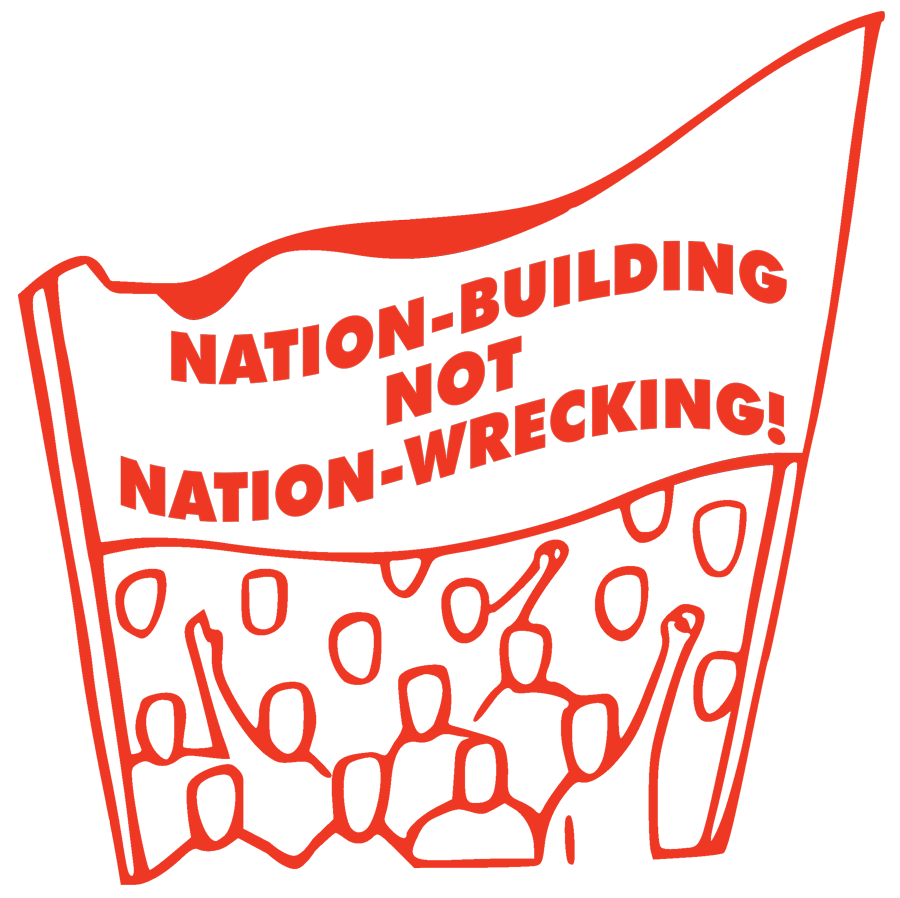 A
modern Canada and a modern constitution are needed to stop the
nation-wrecking of those who have submitted the country to the
decision-making power and empire-building of a foreign power and the
financial interests and oligopolies in its service, supranational
trade arrangements and U.S.-led military alliances and wars. Canada
needs
independence so Canadians can develop modern
human-centred social relations among themselves and with all humanity.
A
modern Canada and a modern constitution are needed to stop the
nation-wrecking of those who have submitted the country to the
decision-making power and empire-building of a foreign power and the
financial interests and oligopolies in its service, supranational
trade arrangements and U.S.-led military alliances and wars. Canada
needs
independence so Canadians can develop modern
human-centred social relations among themselves and with all humanity.
Canada also needs an anti-war government that makes Canada a zone for peace and demands that problems in international relations are solved without violence and war.
History calls on the peoples of Canada and Quebec and the Indigenous peoples and Métis nation to establish modern arrangements among themselves based on a free and equal union of sovereign entities. The challenges are great but the present conditions beckon us all to rise to the task to build a bright future where the rights of all are guaranteed.
Let the working class constitute the nation and vest sovereignty in the people with a modern constitution that builds Canada on the new historical basis!
All Out to Build the New!
The Constitution Does Not Provide the Rights of Citizens and Residents with a Guarantee
The recent history of Canada has witnessed an all-sided offensive against the rights and freedoms of citizens and residents in the name of "national security," the "fight against terror" and "economic prosperity." Many incoherent arguments are given to justify the alleged need to negate rights. In the name of protecting the democracy, freedom of speech is allowed so long as the political police say it is not damaging, based on criteria they claim protects the national interest. The principle that people have rights by virtue of being human under all conditions and that the state is obligated to guarantee those rights does not guide government action. The example of the buyout of the Trans Mountain Corporation and approval of the Trans Mountain Pipeline expansion shows how the prerogative powers of government are used to override serious environmental concerns and the lack of consent of many Indigenous peoples, as well as the Canadian people as a whole.
The
Canadian Charter of Rights and Freedoms was
incorporated into the patriated Constitution in 1982. The Charter
contains the provision of "reasonable limits [on rights and
freedoms] prescribed by law as can be demonstrably justified in a free
and democratic society." The Charter has fallen into crisis and
disrepute as "reasonable limits" defined by the arbitrary
powers of the state known as police powers are not seen to be
"reasonable." To have a tiny elite, that behind closed doors, dictates
the rights the people may or may not have does not go over well. This
is how they were dictated by Lord Durham, representing the
colonial police power, in the 19th century. This has resulted in an
endless arbitrary process of criminalization of
conscience and attacks against the struggles of the people who oppose
the anti-social offensive and the agenda of war and regime change of
the ruling elite on the side of the U.S.
imperialists and U.S.-led NATO.
Attacks on rights under the hoax of exceptional circumstances have become the norm, while communities, such as the Muslim community, are profiled and targeted with a vengeance and without a right to recourse. Nowadays the rulers have given themselves the right to defame whosoever they wish by impugning their character so as to make themselves appear righteous. All of it is done in the name of high ideals such as protecting women, national minorities, Indigenous peoples and LGBTQ2S+ people. The absence of a constitution that prescribes inalienable rights and makes them enforceable and judiciable is acutely felt all across the country. The failure of current institutions to provide mechanisms to sort out conflicting interests, opinion and beliefs shows that the system called a liberal democracy is not commensurate with the needs of the times.
Furthermore, the arrangements at the base of Confederation are being destroyed as governments at all levels, whether federal, provincial or municipal, have been taken over by narrow global private interests. They have become instruments of decisions made on a supranational basis, be that by the G7, G20, IMF, NATO or others.
The ruling elite
no longer consider the old
arrangements of
power-sharing between the federal and provincial governments useful for
the drive for control of the most powerful global interests.
They do not recognize any jurisdiction or limitation on their monopoly
right and striving for domination on a world scale. The contradictions
over federal/provincial power-sharing
agreements have degenerated into dogfights amongst governments serving
definite global monopoly interests. This can be readily seen in the
privatization of everything from education to
health care to government services, infrastructure projects,
transportation and communications and all government policies and
policy-making.
The Prime Minister's Office and certain high level government operatives are continuously caught in schemes to pay the rich such as the global monopoly SNC-Lavalin, Big Pharma, high tech corporations, and war production, to name just a few. The ruling elites have shown themselves to be serial violators of the rule of law internationally as well, openly conspiring with the U.S. to destabilize and overthrow governments targeted for regime change and, in the case of the Bolivarian Republic of Venezuela, mete out collective punishment to its population in the form of “sanctions” amounting to an economic war against the country.
 The
need to renew the Constitution to vest sovereignty in the people
and guarantee their rights as the basis of Canadian sovereignty has
never been greater. Political and constitutional
renewal, far from being outdated or what the ruling elite call "a
divisive issue," is central to opening the path to the progress of
society. In this regard, the working class and other social
classes and strata are called on to examine the evolution of the
democratic institutions in Canada, the interests they serve, in what
direction they are being taken and what needs to be done
to give form and content to the people's aspirations for sovereignty,
empowerment and enlightenment. It is a fundamental human right to be
able to decide and control those political,
economic and social affairs that affect one's life.
The
need to renew the Constitution to vest sovereignty in the people
and guarantee their rights as the basis of Canadian sovereignty has
never been greater. Political and constitutional
renewal, far from being outdated or what the ruling elite call "a
divisive issue," is central to opening the path to the progress of
society. In this regard, the working class and other social
classes and strata are called on to examine the evolution of the
democratic institutions in Canada, the interests they serve, in what
direction they are being taken and what needs to be done
to give form and content to the people's aspirations for sovereignty,
empowerment and enlightenment. It is a fundamental human right to be
able to decide and control those political,
economic and social affairs that affect one's life.
Constitutions and constitutional matters must not be a monopoly of a ruling elite that use them for their own narrow self-serving private interests. They belong to the people fighting to defend their rights. Canadians want to enshrine and codify in a constitution the modern definitions to which they aspire and which are in conformity with the concrete conditions. The fight to renew Confederation on a modern basis is an instrument in the hands of the people to further the public interest, open a path forward and block the arbitrariness, backwardness, anarchy, violence and wars that the ruling elite have unleashed.
Let us organize for a modern constitution and a free and equal union of sovereign peoples whose rights are recognized and guaranteed.
A Modern Constitution for
Canada
Is a Historical
Need
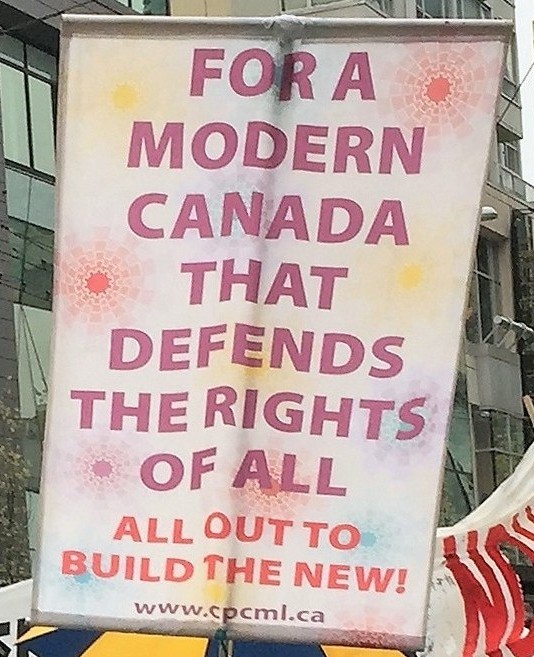 A modern
constitution for
Canada must end the
colonial injustice suffocating the Indigenous peoples and implement the
principles of nation-to-nation relations. It
must recognize Quebec's right to self-determination, provide guarantees
for citizens and residents of the rights they possess by virtue of
being human, and set the stage for the democratic
renewal of the political process so that the peoples of Canada can
directly decide the matters that concern them and affect their lives
and the lives of peoples in other parts of the world
affected by Canada's foreign policy.
A modern
constitution for
Canada must end the
colonial injustice suffocating the Indigenous peoples and implement the
principles of nation-to-nation relations. It
must recognize Quebec's right to self-determination, provide guarantees
for citizens and residents of the rights they possess by virtue of
being human, and set the stage for the democratic
renewal of the political process so that the peoples of Canada can
directly decide the matters that concern them and affect their lives
and the lives of peoples in other parts of the world
affected by Canada's foreign policy.
History calls on the peoples of Canada and Quebec and the Indigenous peoples to establish modern arrangements amongst themselves based on a free and equal union of sovereign entities. On this basis they can face the challenges of the 21st century with the people recognized as sovereign and in control over decision-making, the institutions of the state and the direction of the country.
Where Sovereignty Is Vested
The Constitution of Canada based on the 19th century arrangement of the British North America Act (BNA Act) still considers the Queen of England the sovereign of Canada and its head of state. The document A Consolidation of the Constitution Acts 1867 to 1982 provided by the Department of Justice stipulates, "The Executive Government and Authority of and over Canada is hereby declared to continue and be vested in the Queen." When the BNA Act, an act of the British Parliament was patriated to Canada in 1982, then-Prime Minister of Canada Pierre Trudeau, along with the provincial Premiers, did not see fit to remove this anachronism from the fundamental law of the land. Again, during the talks that led to the Meech Lake Accord of 1987 and in the report on the consensus between the Prime Minister and 10 Premiers that led to the Charlottetown Accord of 1992, no recommendation was made to repeal this clause.
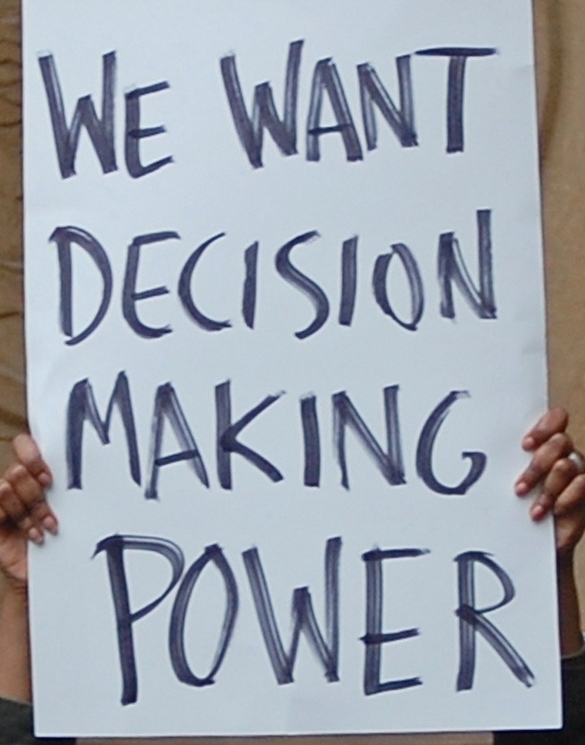 A
change from sovereignty residing in the monarch to sovereignty
residing in the people is not a minor one but a radical departure from
the rule of the few in their narrow interests
over the many, to the rule of the many in the broad public interest. It
is not possible to have a modern constitution consistent with the
aspirations and demands of the people at this time in
history without a clear affirmation and definition that the people are
sovereign. The sovereign power sanctions everything fundamental in
terms of the law of the land and everything that
emanates from it.
A
change from sovereignty residing in the monarch to sovereignty
residing in the people is not a minor one but a radical departure from
the rule of the few in their narrow interests
over the many, to the rule of the many in the broad public interest. It
is not possible to have a modern constitution consistent with the
aspirations and demands of the people at this time in
history without a clear affirmation and definition that the people are
sovereign. The sovereign power sanctions everything fundamental in
terms of the law of the land and everything that
emanates from it.
This anachronism has not been removed because the sovereign power of the state has been transferred to the Prime Minister and Premiers as Queen in Parliament, the Legislatures and National Assembly of Quebec. Keeping the Queen of England as the formal titular head of state allows the ruling elite to hide this fact. The authority of the Prime Minister and Premiers is absolute in the English tradition of concentrating power in the Crown-in-Parliament.
When the Prime Minister or Premiers say they have a mandate to rule for an allotted time frame, legally the Canadian Constitution allows them to do so in an absolutist manner within the separation of the federal and provincial powers. Were the Constitution to declare that sovereignty resides with the Canadian people, then it would have to stipulate the rights and duties the people grant their governments, and how the governments are to be chosen by and accountable to the people. A change in this regard would necessarily mean recognizing and establishing in law that the people are sovereign and creating the legal means to enable them to be so. This formidable epoch-changing modernization of the Constitution is not something the present ruling elite and their cartel political parties are either willing to accomplish or capable of doing.
A democracy that does not provide the citizens of the country with the means to exercise control over the policies and decisions of the elected bodies according to the fundamental law they themselves have enacted, is a form of authoritarian and absolutist rule.
The constitutional arrangements of the last more than 150 years have never vested sovereignty in the people. On the contrary, Confederation in 1867 was a power-sharing arrangement between Britain and the local ruling elite and concerned itself mainly with the division of powers between the central government and the provinces. The promise to submit the agreement that united four provinces into a dominion for the people's approval was quickly abandoned when it became clear that it would have been rejected. Neither the 1982 patriation of the Constitution and addition of a Charter of Rights and Freedoms nor any of the changes made since have overcome the fact that the Constitution of Canada does not emanate from the people and that Confederation did not permit a free and equal union of sovereign peoples.
Quebec Is Said to Be One of Two "Founding Nations" of Canada But Is Not a Signatory to the Constitution Act of 1982
Quebec is not a signatory to the Constitution Act of 1982 as a result of the obstinate refusal of the ruling elite to recognize its right to self-determination. Attempts to sort out Quebec's place in Confederation have failed time and again because all have sought to maintain the anachronistic Anglo-Canadian state arrangements which refuse to recognize Quebec's sovereignty.

Durham's assertion was a deliberately false representation of what had taken place during the Rebellion of 1837-1838 against British rule in Lower Canada. It was an application of the famous British empire-building strategy of divide and rule. The same was done a few years later in India. The British empire-builders proclaimed that the problem in India was that the Muslims and Hindus hated each other. In actual fact Indians of all origins and religions united against British rule in the War of Independence of 1857. The big lie of hatred amongst the people permitted the British colonialists to present themselves as the peacemakers and spread the empire-builders' doctrine of tolerance. Justin Trudeau invokes tolerance in a similar manner today. This kind of thing stigmatizes anyone who contests the present constitutional arrangements as intolerant and backward.
To ensure that the Canadian colonies were seized by resentments based on ethnic and language differences, the Durham Report openly recommended the assimilation of French Canadians, whom it called "a people with no literature and no history." From this self-serving and anti-people perspective, the British empire-builders imposed a legislative union of Upper and Lower Canada and a factional system of party government. This set the stage for institutionalized politics of fomenting antagonisms amongst the people and dividing them along party lines, based on their alleged values.
The Liberal Party of today is born out of a division of the Parti Rouge created by the Patriots to pursue their cause as expressed during the Rebellions of 1837-38. Some in the Parti Rouge were enticed into the politics of division while those who opposed the division and persisted in upholding the republican ideas of the Patriots were persecuted, isolated, imprisoned, hung, left stranded, ostracized and ex-communicated by the Church, their writings forbidden to be distributed and read. The champions of the politics of division went on to create the Liberal Party of Canada following Confederation.
 The
fight for a republic in Lower Canada against the undemocratic
rule of the colonial power and its local ruling elite -- the Château Clique -- comprised of rich and powerful
merchants, had united all democratic-minded people, whatever their
origin. Their struggle was accompanied by a similar uprising in Upper
Canada, led by William Lyon Mackenzie and
directed against the privileges and stranglehold of the ruling clique
there, called the Family Compact.
The
fight for a republic in Lower Canada against the undemocratic
rule of the colonial power and its local ruling elite -- the Château Clique -- comprised of rich and powerful
merchants, had united all democratic-minded people, whatever their
origin. Their struggle was accompanied by a similar uprising in Upper
Canada, led by William Lyon Mackenzie and
directed against the privileges and stranglehold of the ruling clique
there, called the Family Compact.
The politics of division has been used ever since to weigh down the people of Quebec and act as an instrument of oppression of the Quebec nation, with adherents both inside and outside Quebec and even inside and outside the nationalist movement. The motion adopted in 2006 by the government of Stephen Harper "recognizing the nation of Quebec" asserts: "This House recognizes that the Québécois form a nation within a united Canada." The motion confines the nation of Quebec to an ethnic group whose language is French. The motion does not include people who speak other languages and who are of other origins as part of the nation of Quebec. Nor does it uphold nation-to-nation relations with the Indigenous peoples whose unceded territories have been inhabited. The motion introduces a diffuse notion of Québécois without a defined territory, one comprising separated communities across Canada of French Canadian descent. In this convoluted framework, the "nation of Quebec" can never be conceived as sovereign and having the right to self-determination up to and including the right to secede from Canada. As in any marriage, only a free and equal union can hope to flourish.
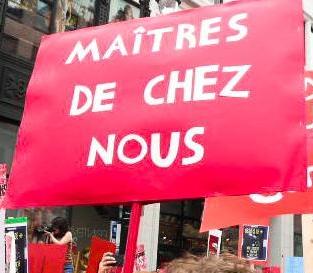
After the October 2015 federal election, Justin Trudeau applied a similar conceit to Canada saying, "There is no core identity, no mainstream in Canada. There are shared values -- openness, respect, compassion, willingness to work hard, to be there for each other, to search for equality and justice."
As concerns Quebec, Justin Trudeau has said on several occasions that "nationalism is an old idea from the 19th century" and is based on "a smallness of thought." He further claims that Canada is "the first postnational state." This desire of Trudeau the younger that Canada be a "postnational state" can be set within the perspective of Trudeau the elder's assertions of "backward nationalism" in the 1960s and 1970s and his prejudice equating nationalism with small-mindedness. The attack of Trudeau father and son on what they call narrow-minded nationalism boils down to an attack on the right of the people to build their decision-making power at their level against the concentration of power in the hands of the privileged few which is today exercised on a supranational level within the neo-liberal global economy. The fight to affirm this right extends from the rebellion against colonial control and the iron grip of the rich merchants of the Château Clique in the 19th century to the striving to end the power of the supranational powerful economic global monopolies and oligopolies of today and their military arms, such as NATO.
The people face an obstinate refusal to recognize Quebec's right to self-determination and the people's right to be and to govern themselves with modern institutions, and the sowing of divisions of all kinds. The ruling elite are incapable of providing Canada with a modern perspective of a free and equal union of the peoples of Canada, Quebec, Indigenous peoples and Métis. In the Canadian federalism based on liberal notions of empire-building, people are subjects and the sovereign power resides in the monarch, which today is a front for the concentration of power in the hands of the Prime Minister's Office acting on behalf of the most powerful monopolies centred in the U.S.-led imperialist system of states.
The Necessity to End Colonial Injustice and Negation of Rights and to Establish Nation-to-Nation Relations with the Indigenous Peoples
The Canadian Constitution does not recognize the inherent hereditary rights and treaty rights of the Indigenous peoples and the sovereignty of their nations. The hereditary rights of the Indigenous peoples are their rights to be and live on their traditional territories according to what their own thought material teaches them, how they define their needs and what they require in the 21st century to concretize their rights and give them full expression. The colonial invasion attempted to negate the hereditary and other rights and development of the peoples who, since time immemorial, have inhabited Turtle Island and the territories of what were called the Americas.[1] This negation of rights must be negated if justice is to prevail and nation-to-nation relations are to be established in practice, allowing the Indigenous peoples to flourish.
The Constitution does not recognize the fiduciary obligations of Canada as a country that was built through the colonial seizure, occupation and exploitation of Indigenous lands and labour and the genocidal attempt to wipe them out as peoples. The fiduciary obligations must ensure that the highest standard of living is guaranteed to the Indigenous peoples and that all services are provided at the highest level modern society has attained. Renewing on a modern basis the relationships amongst sovereign Indigenous nations, the Métis nation, sovereign Quebec and sovereign Canada -- the sovereign peoples as individuals and collectives -- is critical to the renewal of Confederation and the modernization of the conditions of life itself.
 The policies of
the
Liberal government and the denial of the
Conservatives in the Opposition, both of whom are contending to form
the next government, are as unprincipled as they are
pragmatic. Justin Trudeau's senior Assistant Deputy Minister for
Treaties and Aboriginal Government, Crown-Indigenous Relations, Joe
Wild, in discussing ways to "breathe new
life" into the Canadian Constitution regarding Canada's relations with
First Nations and their sovereignty, said, "There is a notion of
sovereignty that can still exist in a way that doesn't
threaten the fabric of the nation. There may be a few areas where
you've got to be a little bit careful, like raising an army, the border
of the country versus other countries, but the rest of
it? You could probably figure out ways in which it kind of works out
and it doesn't actually do anything that would threaten the standing of
Canada as Canada."[2]
Wild also said his government will deal with each Indigenous community
or nation as a separate entity to try to reach an agreement with each
one of them.
The policies of
the
Liberal government and the denial of the
Conservatives in the Opposition, both of whom are contending to form
the next government, are as unprincipled as they are
pragmatic. Justin Trudeau's senior Assistant Deputy Minister for
Treaties and Aboriginal Government, Crown-Indigenous Relations, Joe
Wild, in discussing ways to "breathe new
life" into the Canadian Constitution regarding Canada's relations with
First Nations and their sovereignty, said, "There is a notion of
sovereignty that can still exist in a way that doesn't
threaten the fabric of the nation. There may be a few areas where
you've got to be a little bit careful, like raising an army, the border
of the country versus other countries, but the rest of
it? You could probably figure out ways in which it kind of works out
and it doesn't actually do anything that would threaten the standing of
Canada as Canada."[2]
Wild also said his government will deal with each Indigenous community
or nation as a separate entity to try to reach an agreement with each
one of them.
Wild's comments indicate the continuation of an oppressive colonial relation which today the Trudeau government reiterates when it says it will carry on making decisions that affect the lives of Indigenous peoples without their consent. The fight of Indigenous peoples for sovereignty on their lands and in all decision-making does not have to answer to a greater power that decides for them and claims that it represents the fabric of the nation. Sovereignty means that the Indigenous peoples decide and their relations with Canada are relations between sovereign entities with the modern relationship enshrined in the Constitution. The renewal of the Constitution must eliminate any vestige of colonial relations and the catch-phrases such as "collaborative approach" etc, which mean in practice the continuation of the status quo.
 The demand for a
modern
constitution is yet another struggle
bringing Indigenous, Canadian and Quebec peoples into closer united
action for their rights. The struggle of all the peoples
is at heart one fight -- the fight for political and constitutional
renewal so that the rights of all can be guaranteed in a modern
constitution that recognizes, upholds and guarantees the rights
of all. The 19th century colonial racist Canadian state and its
retrogressive Constitution are blocking the forward movement of society
for which all the peoples as individuals and collectives
aspire.
The demand for a
modern
constitution is yet another struggle
bringing Indigenous, Canadian and Quebec peoples into closer united
action for their rights. The struggle of all the peoples
is at heart one fight -- the fight for political and constitutional
renewal so that the rights of all can be guaranteed in a modern
constitution that recognizes, upholds and guarantees the rights
of all. The 19th century colonial racist Canadian state and its
retrogressive Constitution are blocking the forward movement of society
for which all the peoples as individuals and collectives
aspire.
The time is now for women and youth, together with all the working people and their allies in other strata and classes across Canada and Quebec to work together with the Indigenous peoples for a profound renewal of the political arrangements in the society and to deprive the authorities of their power to deprive the people of their rights. The peoples themselves must be empowered to take control of their economic, political and social affairs. Constitutional and political renewal is a precondition for true reconciliation amongst the Indigenous peoples, Canada and Quebec.
Notes
1. Abya Yala is the term with which the Cuna Indians (Panama) refer to the entire American continent. It means "land in full maturity" and was suggested by the Aymara leader Takir Mamani, who proposed that all Indigenous peoples use it in their documents and oral statements because to call the land with the strange name of New World is not acceptable.
2. June 4, 2017.
(Abridged from article originally published in TML Weekly Information Project Vol. 49 No. 24, June 29, 2019)
Conception of Rights in Canada's Constitution
The conception of rights enshrined in the current Constitution of Canada dates back to the days of the British conquest and rebellions against it. It is a conception that enshrines and protects the rights of the Crown with institutions, values, aims and practices established for that purpose. Before that, the French Crown also imposed laws and practices in defence of private property which also contributed to shaping the country's future.
In order to understand the conception of rights enshrined in the Constitution it is necessary to look at the conditions which prevailed at any particular time, how the ruling elites dealt with them, in whose interests they intervened and the results of the intervention.
For instance, between 1663 and 1673, under the tutelage of King Louis XIV of France, some 800 young women were sent to what was then called New France "to marry, found a home and establish a family to colonize the territory." What is often not told is that any of the men of European descent who were joined to Indigenous women and rejected this edict were deprived of their property. Refusing to succumb to unjust laws, French and Scottish fur traders moved west and joined their lives to those of the Cree and Anishinabe (Ojibway). Their descendants formed a distinct culture, collective consciousness and nationhood in the Northwest. They established distinct Métis communities along the fur trade routes which were also brutally attacked by the colonial settler state to deprive them of their lands and way of life.
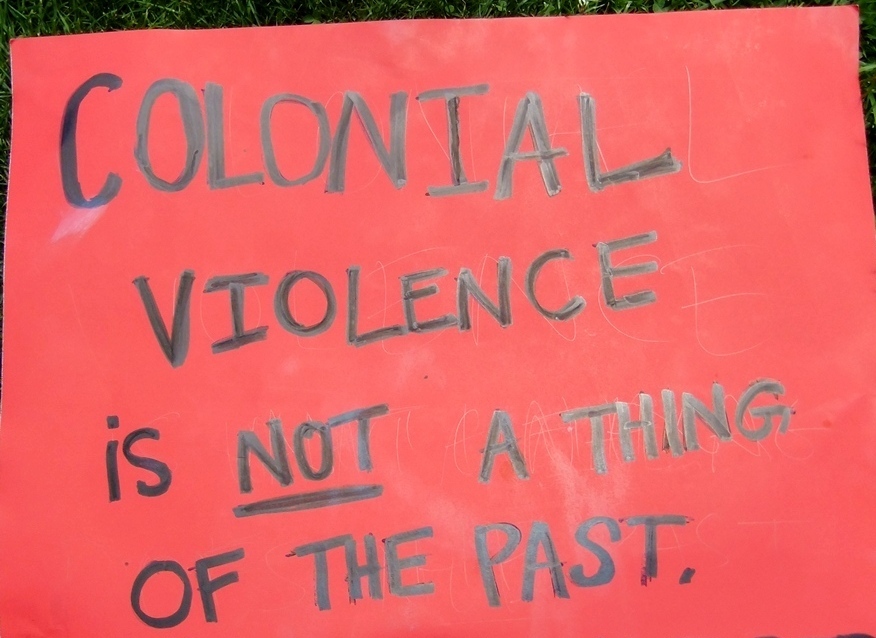 The
colonial
state
used racism to divide the peoples from the
get-go, declaring the Indigenous way of life as devil-inspired and the
Indigenous peoples to be the enemies of the
aspirations of the settlers to establish homes, farms and communities.
The British policy of divide-and-rule was at the basis of the
conception of rights which enshrines private property and
puts all decision-making power and the monopoly on the use of force in
the hands of an elite which usurps power for purposes of enriching
themselves at the expense of all others. So long as the settlers served
their purpose, all the better but no sooner the peoples united against
injustice, all have been dealt with brutally no
matter who they are.
The
colonial
state
used racism to divide the peoples from the
get-go, declaring the Indigenous way of life as devil-inspired and the
Indigenous peoples to be the enemies of the
aspirations of the settlers to establish homes, farms and communities.
The British policy of divide-and-rule was at the basis of the
conception of rights which enshrines private property and
puts all decision-making power and the monopoly on the use of force in
the hands of an elite which usurps power for purposes of enriching
themselves at the expense of all others. So long as the settlers served
their purpose, all the better but no sooner the peoples united against
injustice, all have been dealt with brutally no
matter who they are.
The republican conception of rights put forward by the Quebec Patriots as well as the reformers in Upper Canada in the mid-1800s are another case in point. The British opposed this conception which called for vesting sovereignty in the people no matter their national origin. The British brutally suppressed the rebellions and denied any conception of rights which would vest decision-making in the people.
Meanwhile, to understand the conception of rights imposed by the British in the Constitutions of 1840, 1867 and 1982, it is necessary to see what the conditions reveal today. For instance, conditions today show that the incorporation of the Royal Proclamation of 1763 into the Constitution 1867 made the Indigenous peoples wards of the Crown and designated all their lands Crown lands.
We go into the past to enrich our ability to solve problems and open society's path to progress today.
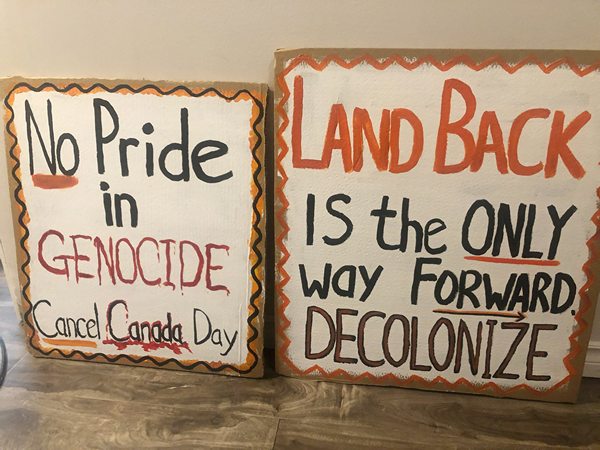 In this regard,
CPC(M-L) takes the
approach to the study of history
and political theory in a manner which deals with the relations people
enter into and what kind of society this gives
rise to. This includes a militant call to oppose attempts to divide the
people for purposes of maintaining the status quo, a practice
introduced by the British colonialists and upheld by the
Anglo-Canadian colonial state established on the basis of carrying out
the genocide of Indigenous peoples whose lands were expropriated and
everything was done to extinguish their way of
life. Despite the Supreme Court of Canada's verdict that the
colonizer's "doctrine of discovery" known as terra nullius (that
the land belonged to nobody prior to European assertion
of sovereignty) never applied in Canada, "as confirmed by the Royal
Proclamation (1763)," the fact remains that what is called the colonial
settler state -- to distinguish it from a colonial
state which did not import people to settle the land but used the local
people to serve the colonial power -- did not consider
Indigenous
peoples to be human beings. It made them wards of
the state with no names and set a course of cultural genocide to
extinguish their way of life. This led to what can only be called
crimes against humanity and acts of genocide which carry
on to this day. The treatment of the Indigenous peoples informs the
notion of rights contained in Canada's Constitution. To understand the
Constitution requires recognizing the truth of the
relations between the racist Anglo-Canadian state and the Indigenous
peoples.
In this regard,
CPC(M-L) takes the
approach to the study of history
and political theory in a manner which deals with the relations people
enter into and what kind of society this gives
rise to. This includes a militant call to oppose attempts to divide the
people for purposes of maintaining the status quo, a practice
introduced by the British colonialists and upheld by the
Anglo-Canadian colonial state established on the basis of carrying out
the genocide of Indigenous peoples whose lands were expropriated and
everything was done to extinguish their way of
life. Despite the Supreme Court of Canada's verdict that the
colonizer's "doctrine of discovery" known as terra nullius (that
the land belonged to nobody prior to European assertion
of sovereignty) never applied in Canada, "as confirmed by the Royal
Proclamation (1763)," the fact remains that what is called the colonial
settler state -- to distinguish it from a colonial
state which did not import people to settle the land but used the local
people to serve the colonial power -- did not consider
Indigenous
peoples to be human beings. It made them wards of
the state with no names and set a course of cultural genocide to
extinguish their way of life. This led to what can only be called
crimes against humanity and acts of genocide which carry
on to this day. The treatment of the Indigenous peoples informs the
notion of rights contained in Canada's Constitution. To understand the
Constitution requires recognizing the truth of the
relations between the racist Anglo-Canadian state and the Indigenous
peoples.
So too the suppression of the Métis Nation striving to declare nationhood in Manitoba which the ruling elite used to give rise to the Northwest Mounted Police and then the Royal Canadian Mounted Police. The conception of rights which are privileges and are given and taken away by "the Crown" at its sole discretion is a medieval remnant incorporated into the Constitution to underscore the division of the polity between those who govern and take all the decisions on the basis of the self-interest of the person of state and those who are governed and are kept separate, in a subservient position.
An integral part of this history concerns the relations between trappers, voyageurs, fur traders settlers and Indigenous peoples and between them and established colonial institutions of rule, including the Catholic Church in Quebec whose main role was to keep the habitants in thrall, and the relations between the Indigenous peoples and the patriots in Lower and Upper Canada, as well as help they received from American revolutionaries at the time and enlightenment forces in Europe and the Americas.
The struggle of the Patriots in the mid-1800s espoused the most advanced ideas of the time, as did Louis Riel when founding the Métis nation in Manitoba. For instance, in Quebec, the patriots based their nation-building project on the anti-colonial cause, the abolition of the feudal seigneurial system, the granting of citizenship rights equally without distinction as to national origin or belief, gender or other consideration, including to the Indigenous peoples. The Anglo-Canadian state continued to treat Indigenous peoples as non-persons until the 1960s and continues to treat people of Indigenous origin as second class members of the polity to this day. It does the same with all migrants and workers of all origins under conditions of a so-called global labour market which considers human beings to be disposable.
 The Quebec Patriot's Declaration of
Independence issued in 1838
called for the constitution of a republican form of government to
enshrine those ideals as the law of the land. This
cause was akin to the great wars of independence in Latin America and
the Caribbean at that time as well as the national movements in Italy
and other countries. Related developments in
those days led to the formation of the International Working Men's
Association by Marx and Engels in 1864 and, in 1871, to the Paris
Commune.
The Quebec Patriot's Declaration of
Independence issued in 1838
called for the constitution of a republican form of government to
enshrine those ideals as the law of the land. This
cause was akin to the great wars of independence in Latin America and
the Caribbean at that time as well as the national movements in Italy
and other countries. Related developments in
those days led to the formation of the International Working Men's
Association by Marx and Engels in 1864 and, in 1871, to the Paris
Commune.
The Patriots fought for institutions consistent with the needs of the times, especially the demand that decision-making power be vested in the citizens of the new republic, not in the British Crown. For this, their rebellion was crushed by the British through force of arms, the suspension of civil liberties, mass arrests, burning of homes, the hanging of 12 Patriots and the forced exile of 64 others.
It should be kept in mind that this was also the era when in the United States the direction was set on the basis of the ideology of Manifest Destiny. It held that "European Americans" -- i.e. white people -- were "divinely ordained to settle the whole of the North American continent." The slave state in the hands of white men of property pushed settlers ever further westward towards the Pacific, eventually herding the Indigenous peoples into reservations, engaged in murderous campaigns to wipe them out and has sought ever since to deprive them on their hereditary lands, resources and hereditary rights as well as rights by virtue of being human. All of this spilled over into what was known as "British North America." The North West Mounted Police (NWMP) was specifically established in 1873 to bring the authority of the Crown to the North West Territories (present-day Alberta and Saskatchewan). Its jurisdiction grew to include the Yukon in 1895, the Arctic Coast in 1903 and northern Manitoba in 1912. In 1904 King Edward VII added the word Royal to the NWMP which then subsequently became the Royal Canadian Mounted police (RCMP).
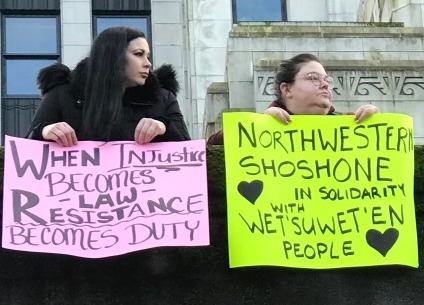 The
conception of rights contained in the Constitution of the
country called Canada does not protect anyone from the ongoing assault
on the hereditary and human rights of Indigenous
peoples and the global anti-social offensive which treats the peoples
of all origins and occupations as "disposable" and those who resist as
criminals. This is so because there is no way to
sort out conflicting interests in a peaceful manner which advances
nation-building. Societies are under constant attack today. The saying
applies "If injustice is law, resistance is duty." It is
not a matter of laws and rules. It is a matter of a just cause and
social responsibility to intervene for justice, for rights. Human
agency is intervening to affirm rights. It is pro-active and not
primarily a matter of being reactive to laws and rules imposed by the
state which to this day is based on the anachronistic definition of
rights enshrined in the Constitution, including the
Charter of Rights of
Freedoms added in 1982.
The
conception of rights contained in the Constitution of the
country called Canada does not protect anyone from the ongoing assault
on the hereditary and human rights of Indigenous
peoples and the global anti-social offensive which treats the peoples
of all origins and occupations as "disposable" and those who resist as
criminals. This is so because there is no way to
sort out conflicting interests in a peaceful manner which advances
nation-building. Societies are under constant attack today. The saying
applies "If injustice is law, resistance is duty." It is
not a matter of laws and rules. It is a matter of a just cause and
social responsibility to intervene for justice, for rights. Human
agency is intervening to affirm rights. It is pro-active and not
primarily a matter of being reactive to laws and rules imposed by the
state which to this day is based on the anachronistic definition of
rights enshrined in the Constitution, including the
Charter of Rights of
Freedoms added in 1982.
The need for the political movements of the people to take up the work for a modern constitution cannot be overemphasized. Only the working people have an interest in enshrining the rights which belong to all by virtue of their being. Establishing cohesion within the body politic around the independent politics of the working class is urgently needed to open a path to progress and avert the dangers which lie ahead as a result of the use of force to impose the will of the Crown in the name of high ideals.
(To access articles individually click on the black headline.)
Website: www.cpcml.ca Email: editor@cpcml.ca
